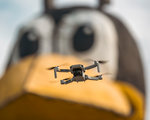

Is it legal for a drone to fly over your property without your permission?
That’s just one of the questions Centralia resident Jeremy Corwin had when he spotted one of the small, unmanned aircraft flying high above his house on Oct. 22.
But this wasn’t your average recreational drone.
According to emails exchanged with City of Centralia staff, this was a $60,000 LiDAR (Light Detection and Range) drone that was conducting a survey on the nearby former Armory Hills Golf Course property, which totals 33 acres.
The request for the survey came from an interested buyer who contracted drone pilot Ron Melin to create a detailed topographical map of the area — 240 acres in total, he said in an email to city staff — for a feasibility study.
The survey area included nearby plots, including Corwin’s 30 acres of land, which drew both his ire and curiosity.
“From my point of view, it’s an invasion of privacy and security, and yet you have no say in it. Someone can fly a drone over your property,” Corwin said.
It’s unlikely that Melin broke any laws by flying his drone in what the Federal Aviation Administration (FAA) deems “uncontrolled airspace,” which is below 400 feet elevation. He did not return a Tuesday phone call for further comment.
Friction Over Air Space
Corwin said he spotted the drone flying near his house on both Oct. 22 and 23. Fearful for his nine children’s privacy, he called the police during both incidents.
On Saturday, Oct. 23, Corwin said he was able to approach Melin, who explained that he was surveying adjacent properties. When asked to stop his work, Corwin said Melin declined.
In emails to city staff later that day, Corwin said he wanted to pursue “legal recourse,” or at the very least be notified the next time LiDAR and aerial photos of his property were being taken.
“To me, I’d rather them not be able to fly over my property,” Corwin told The Chronicle, adding that “you never know” who might be scoping out your property.
Voyeurism — which drones can be used to commit — under Washington state law is a second-degree gross misdemeanor, according to RCW 9A.44.105.
At the very least, he said, he would like to see state or local laws on drones amended to require a notification clause for private businesses that collect data on private property. He’s reached out to Sen. John Braun’s office, as well as the Centralia City Council.
“The missions I flew on Friday and Saturday were conducted at 300 feet above ground level at a velocity of 15 miles per hour. I would agree with Mr. Corwin that a drone hovering outside your house taking photos or video of you and your family is definitely a nuisance and probably illegal, but at no time was my aircraft hovering — it was in constant motion. There was no illegal peeping or surveillance involved,” Melin wrote in the Oct. 24 email thread.
Melin wrote that he was very sensitive to people’s concerns around privacy and property rights, adding that it’s “always in the back of my mind.”
“However, in this case I was operating legally within an established regulatory framework. It's unfortunate that I made Mr. Corwin's family feel unsafe, but I assure you there was no malice or evil intent. I was simply helping a local landowner survey his property to help him plan future development,” he wrote.
Laws As They Exist
Many cities in Washington state, including Centralia, have municipal code banning the use of drones in public parks, but little else exists in the way of blanket restrictions.
The FAA is the primary regulator when it comes to air traffic, which includes drones and small unmanned aircrafts. According to B4UFLY, the FAA’s community resource smartphone application on drone safety and airspace awareness, flying such aircraft around special use airspace, stadiums, controlled airspaces, airports, U.S. National Parks and other locations is restricted.
Special Services Bureau Chief Kevin Engelbertson operates a relatively new drone program with two other deputies at the Lewis County Sheriff’s Office.
All three had to test for their Part 107 license — which is what Melin claimed to hold — which he said is required for all commercial and municipal drone work.
So far, the sheriff’s office has used drones only in a handful of cases. Those include mostly search and rescues.
“Unless the city has an ordinance on it that I don’t know about, I don’t see a reason why they couldn't” operate a drone within city limits, Engelbertson said.
Calls from county residents worried about drone surveillance are few and far between, Engelbertson said, and when Lewis County Sheriff’s Office does respond to those calls, generally people are understanding of it.
“We often get the question ‘Can I shoot it down?’ No, you cannot shoot it down,” he said.
Engelbertson said the sheriff’s office recommends concerned citizens politely approach drone pilots and ask them to stop if a property nuisance occurs.